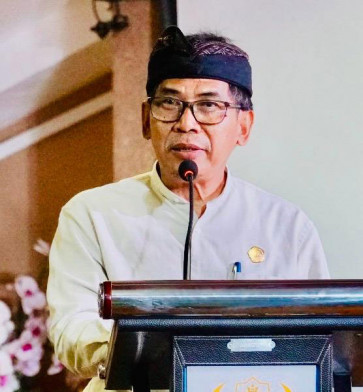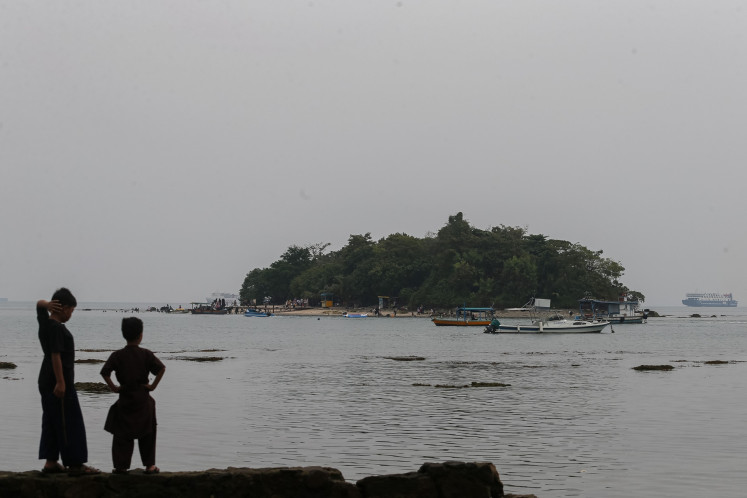Popular Reads
Top Results
Can't find what you're looking for?
View all search resultsPopular Reads
Top Results
Can't find what you're looking for?
View all search resultsAn alternative insight on religion and spirituality in Java
In a recently released documentary about religion in Java, violent militants and religious conflicts are almost ignored
Change text size
Gift Premium Articles
to Anyone

In a recently released documentary about religion in Java, violent militants and religious conflicts are almost ignored.
Instead, throughout the movie, which was screened at the University of Melbourne last month, the audience heard stories and statements about spirituality ranging from the philosophical to downright miraculous.
These stories came from various sources, some appeared very confident about their knowledge and others hinted that they were still searching for the right path to take.
Among them a religious 'healer', and his patient, who experienced a vision that she said led her to the healer, moderate Muslims and Christians, a guardian of a sacred forest, and a pilgrim searching for enlightenment by walking across Java.
The Java Spirit is anthropologist and producer Thomas Reuter's first movie. It came about in the context of his 12-year long research about religious traditions in Java and religious diversity and change.
Working with essentially four crew members, Reuter said that it took around three years to complete the project, with the first lot of filming taking place in 2010.
Stories told in The Java Spirit countered many negative stereotypes often attached to certain words, such as supranatural (superstition) and ngelmu (learning magic). One source in the movie, for example, explained his approach to the supranatural as stemming from the belief that all that is good comes from God, when the word in Indonesia is often associated with stories of ghosts and evil spirits.
The word ngelmu is often associated with black magic, but a source in the movie describes it as being closer to its root word ilmu (knowledge).
While the 45-minute long movie provides brief insights into ancient spiritual elements rooted in Javanese civilization, such as the Pura Loka Moksa Jayabaya temple in Kediri, East Java, various shrines and tombs, as well as sacred forests, it also turns its spotlight at times to spiritual 'pilgrims', who say that they are seeking enlightenment and deeper understanding of life and the afterlife.
Some of these pilgrims may experience certain visions that cause them to become what Reuter dubs as 'born-again Muslims.'
One source in the movie, for instance, claimed that he had walked for 29 days through various regions in Java in his spiritual adventure. At one point he fell into a deep hole and saw a vision of the Prophet Muhammad.
Reuter said that the story was very similar to stories told by many born-again Christians, who 'claim that they have met Jesus, that in their encounter they saw a light, their lives were transformed, their whole life circumstances improved, and they were in a way reborn. They became a new and better person. One can see that those kinds of phenomena, normally attributed to the US for example, which has a lot of born again Christians, born again Muslims are the equivalent here'.
He said that the motive among born-again Muslims and Christians were similar ' one of wanting to have a personal relationship with God or the prophet.
'They want to have direct experience. They don't want to simply be told to read that book and believe in it ['¦],' added Reuter, who has worked at Australia's Monash University, the University of Heidelberg in Germany and is currently a Fellow in the University of Melbourne's Asia Institute.
One of the messages conveyed in the movie is, thus, that the search for spiritual enlightenment is quite universal. The 'searchers' or 'pilgrims' in the movie, along with the 'healers' bear many similarities with the spiritual pilgrims in the 'Western' world often associated with the new age movement, for instance.
Reuter said that he consciously avoided portraying small groups or individuals that display a militant fundamentalist attitude, such as hardline Islamic groups who raid bars and clubs during the period just prior to the Muslim fasting month or calling for the application of Sharia law, because, according to him, those groups are already portrayed extensively in the media.
'I was simply trying to create a more balanced view of what religion is like in the Indonesian context. The view we have in the mass media is terribly distorted. It is basically designed to carve Indonesia in the image of a country where religion is used to justify political violence and terrorism,' he said.
Reuter added that hard-line groups are actually a tiny minority in Indonesia today.
'Moderate and thoughtful people are the majority, certainly in Java. I think there was a period between 2001 to 2004 when there was a very strong reaction to the war on terror in Indonesia, and fundamentalist views were temporarily mainstreamed. Since then, I think there has been a lot of debate and most people have settled down with views that are very balanced and sensible,' Reuter said.
Ideals aside, his avoidance of depicting such groups may induce a number of questions for the audience, especially those who have been following the news about the alleged rise of Islamic conservatism in Indonesia.
One question, perhaps, is whether the moderate and thoughtful majority, along with those practicing Islam infused with elements such as Javanese ritual practices, are in conflict with those labeled as fundamentalists.
And violent groups waving religious banners can be hard to ignore. Jakarta Police's intelligence sub directorate head Adj. Sr. Comr. Titik Valentina said earlier this month, for example, that the police were already preparing for violent raids conducted by such groups toward entertainment business nearing the Muslim fasting month of Ramadhan, which is scheduled to start next month.
The Islam Defenders Front (FPI) was recently reported to have attacked an interfaith discussion in Surabaya.
Lined at times with melodies of gamelan ensembles and featuring minimal narration, The Java Spirit offers an interesting insight to the many varieties of people practicing spirituality in Java. While it is rich with quotes and characters, its cinematography is far from breathtaking, because it mostly features standard interview shots.
Prof. Reuter is hoping to screen the movie, which will be distributed by Ronin Films, in the Yogyakarta Film Festival and the European Association for South East Asian Studies (EuroSEAS) Conference in Portugal this year.
' Photos courtesy of Thomas Reuter









